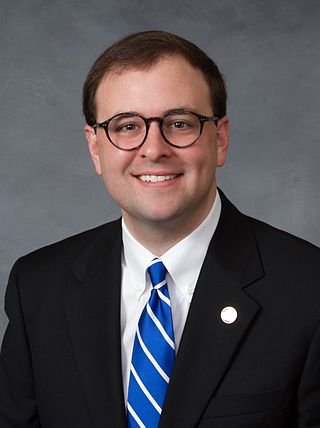
The State University of New York is a system of public colleges and universities in the State of New York. It is one of the largest comprehensive systems of universities, colleges, and community colleges in the United States. Led by chancellor John B. King, the SUNY system has 91,182 employees, including 32,496 faculty members, and some 7,660 degree and certificate programs overall and a $13.37 billion budget. Its flagship universities are Stony Brook University on Long Island and the University at Buffalo.
Tuition payments, usually known as tuition in American English and as tuition fees in Commonwealth English, are fees charged by education institutions for instruction or other services. Besides public spending, private spending via tuition payments are the largest revenue sources for education institutions in some countries. In most developed countries, especially countries in Scandinavia and Continental Europe, there are no or only nominal tuition fees for all forms of education, including university and other higher education.
A public university or public college is a university or college that is owned by the state or receives significant funding from a government.

Eastern Oregon University (EOU) is a public university in La Grande, Oregon. It was formerly part of the Oregon University System, since dissolved. EOU was founded in 1929 as a teacher’s college and today serves as a center for education, culture, and scholarship in rural areas of Oregon.

The Oregon Legislative Assembly is the state legislature for the U.S. state of Oregon. The Legislative Assembly is bicameral, consisting of an upper and lower house: the Senate, whose 30 members are elected to serve four-year terms; and the House of Representatives, with 60 members elected to two-year terms. There are no term limits for either house in the Legislative Assembly.
The Texas Tomorrow Fund is a prepaid college investment program operating in Texas.

College tuition in the United States is the cost of higher education collected by educational institutions in the United States, and paid by individuals. It does not include the tuition covered through general taxes or from other government funds, or that which is paid from university endowment funds or gifts. Tuition for college has increased as the value, quality, and quantity of education have increased. Many feel that increases in cost have not been accompanied by increases in quality, and that administrative costs are excessive. The value of a college education has become a topic of national debate in the U.S.

Frank Vana Chopp is an American politician serving as a Democratic member of the Washington House of Representatives, representing the 43rd district since 1995. His district covers the neighborhoods of Montlake, Fremont, Wallingford, the University District, Madison Park, and part of Capitol Hill, all of which are in Seattle. Chopp served as Speaker of the House from 2002 to 2019.

The University of Oregon School of Law is a public law school in the U.S. state of Oregon. Housed in the Knight Law Center, it is Oregon's only state funded law school. The school, founded in 1884, is located on the University of Oregon campus in Eugene, on the corner of 15th and Agate streets, overlooking Hayward Field.

Mark Hass is an American politician from the US state of Oregon. A Democrat, he was the representative for District 14 in the Oregon State Senate from November 21, 2007, until January 10, 2021. He sought the office of Oregon Secretary of State in 2020.
Student debt is a form of debt that is owed by an attending, formerly withdrawn, or graduated student to a lending institution, or to a financial institution.
Florida A&M University College of Law or FAMU College of Law is an ABA-accredited law school in Orlando, Florida, United States. It is part of Florida A&M University.
The Browne Review or Independent Review of Higher Education Funding and Student Finance was a review to consider the future direction of higher education funding in England.
The higher education bubble in the United States is the possibility that excessive investment in higher education could have negative repercussions in the broader economy. Although college tuition payments are rising, the supply of college graduates in many fields of study is exceeding the demand for their skills, which aggravates graduate unemployment and underemployment while increasing the burden of student loan defaults on financial institutions and taxpayers. Moreover, the higher education bubble might be even more serious than load of student debts. Without safeguards in place for funding and loans, the government risks creating a moral hazard in which schools charge students expensive tuition fees without offering them marketable skills in return. The claim has generally been used to justify cuts to public higher education spending, tax cuts, or a shift of government spending towards law enforcement and national security. There is a further concern that having an excess supply of college graduates exacerbates political instability, historically linked to having a bulge in the number of young degree holders.
The California DREAMAct is a package of California state laws that allow children who were brought into the US under the age of 16 without proper visas/immigration documentation who have attended school on a regular basis and otherwise meet in-state tuition and GPA requirements to apply for student financial aid benefits. It and past similarly named legislation have been authored by California State Senator Gil Cedillo.

Lew Frederick is an American Democratic politician, currently representing District 22 in the Oregon Senate.

John Chadwick "Chad" Barefoot is a former Republican member of the North Carolina Senate, representing North Carolina's 18th Senate district from 2013 to 2018. Senate District 18 covers Franklin County and parts of eastern and southern Wake County.
An income share agreement is a financial structure in which an individual or organization provides something of value to a recipient who, in exchange, agrees to pay back a percentage of their income for a fixed number of years.
Financial issues facing students in the United States include the rising cost of tuition, as well as ancillaries, such as room and board, textbook and coursework costs, personal expenses, and transportation.

The Senate Concurrent Resolution 1044 or Arizona In-Sate Tuition for Non-Citizen Resident Measure is a legislatively referred state statute on the ballot for the November 8, 2022 election in Arizona. SCR 1044 would repeal provisions of Proposition 300 passed in 2006. SCR 1044 would give voters the opportunity to allow all students, including Arizonan Dreamers, to receive in-state college tuition when a student (a) attended a school in Arizona for a minimum of two years and (b) graduated from a public school, private school, or homeschool in Arizona.









